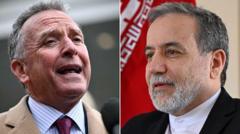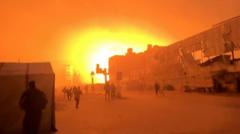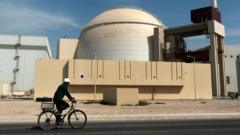As the conflict in Gaza reignites, political analysts observe a shift in global responses, particularly with the return of former President Donald Trump to office. Three weeks into a new Israeli offensive that has resulted in extensive casualties, the vitriol that would typically follow such escalatory actions appears muted.
Trump's Comeback Gives Netanyahu Leverage in Gaza Conflict

Trump's Comeback Gives Netanyahu Leverage in Gaza Conflict
The dynamics of U.S.-Israel relations shift as President Trump resumes office, granting Netanyahu the freedom to escalate military actions in Gaza without significant American or European pushback.
In previous years under President Biden, strong admonishments from Western nations, including demands for restraint from Israeli Prime Minister Benjamin Netanyahu, would have been the norm. This time, however, with Trump back in the Oval Office, the pressure is greatly diminished. Europe is embroiled in its own issues, particularly resulting from Trump's trade war, leaving Netanyahu with increased political freedom.
During a recent meeting, Trump praised Netanyahu as “a great leader,” with no substantial criticism directed at Israel’s military actions. Analysts believe that this silence contributes to Netanyahu's perception of increased leeway in his military strategy. Sanam Vakil, a director at Chatham House, noted that Netanyahu seems emboldened by the lack of repercussions following intensified attacks on Gaza.
The situation prompts questions regarding the broader implications for U.S.-Middle East relations, the ongoing humanitarian crisis in Gaza, and the reactions from international communities who have historically played a pivotal role in mediating conflicts in the region. With Trump's administration showing signs of indifference to humanitarian concerns, the international discourse around Israeli military actions will likely shift dramatically, favoring a more ambiguous stance on accountability and restraint regarding the ongoing violence in Gaza.
During a recent meeting, Trump praised Netanyahu as “a great leader,” with no substantial criticism directed at Israel’s military actions. Analysts believe that this silence contributes to Netanyahu's perception of increased leeway in his military strategy. Sanam Vakil, a director at Chatham House, noted that Netanyahu seems emboldened by the lack of repercussions following intensified attacks on Gaza.
The situation prompts questions regarding the broader implications for U.S.-Middle East relations, the ongoing humanitarian crisis in Gaza, and the reactions from international communities who have historically played a pivotal role in mediating conflicts in the region. With Trump's administration showing signs of indifference to humanitarian concerns, the international discourse around Israeli military actions will likely shift dramatically, favoring a more ambiguous stance on accountability and restraint regarding the ongoing violence in Gaza.






















